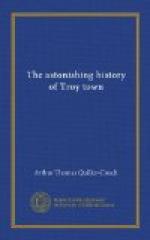“I do, tho’. Look at King Richard—him i’ the play-actin’. I reckon he was wan o’ the hupper ten ef anybody. An’ what does he do? Why, throttles a pair o’ babbies, puts a gen’l’m’n he’d a gridge agen into a cask o’ wine—which were the spoliation o’ both—murders ’most ivery wan he claps eyes on, an’ then when he’ve a-got the jumps an’ sees the sperrits an’ blue fire, goes off an’ offers to swap hes whole bloomin’ kingdom for a hoss—a hoss, mind you, he hadn’ seen, let alone not bein’ in a state o’ mind to jedge hoss-flesh. What’s true o’ kings I reckon es true o’ Hon’rubbles; they’m all reared up to the same high notions, an’ I reckon us’ll find et out afore long. I niver seed no good in makin’ Troy fash’nubble mysel’.”
CHAPTER XIII.
THE SIGNIFICANCE OF POMEROY’S CAT; AND HOW THE MEN AND WOMEN OF TROY ENSUED AFTER PLEASURE IN BOATS.
The historian of Troy here feels at liberty to pass over six weeks with but scanty record. During that time the Bankshire rose bloomed over Kit’s House, peered in at the windows, and found Mr. Fogo for the most part busied in peaceful carpentry, though with a mysterious trouble in his breast that at times drove him afield on venturous perambulations, or to his boat to work off by rowing his too-meditative fit. From these excursions he would return tired in body but in heart eased, and resume his humdrum life tranquilly enough; though Caleb was growing uneasy, and felt it necessary, more than once, to retire apart and “have et out,” as he put it, with his conscience.
“Question es,” he would repeat, “whether I be justyfied in meddlin’ wi’ the Cou’se o’ Natur’—’speshully when the Cou’se o’ Natur’ es sich as I approves. An’ s’posin’ I bain’t, furder question es, whether I be right in receivin’ wan pound a week an’ a new set o’ small-clothes.”
This nice point in casuistry was settled for the time by his waiving claim to the small-clothes, and inserting in his old pair a patch of blue seacloth that contrasted extravagantly with the veteran stuff— so extravagantly as to compel Mr. Fogo’s attention.
“Does it never strike you,” he asked one day as Caleb was stooping over the wood-pile, “that the repairs in your trousers, Caleb, are a trifle emphatic? Purpureus, late qui splendeat—h’m, h’m— adsuitur pannus. I mean, in the seat of your—”
“Conscience, sir,” said Caleb abruptly. “Some ties a bit o’ string round the finger to help the mem’ry. I does et this way.”
“Well, well, I should have thought it more apt to assist the memory of others. Still, of course, you know best.”
And Mr. Fogo resumed his work, and thought no more about it; but Caleb alternated between moods of pensiveness and fussy energy for some days after.
In Troy, summer was leading on a train of events not to be classed among periodic phenomena. It stands on record, for instance—




